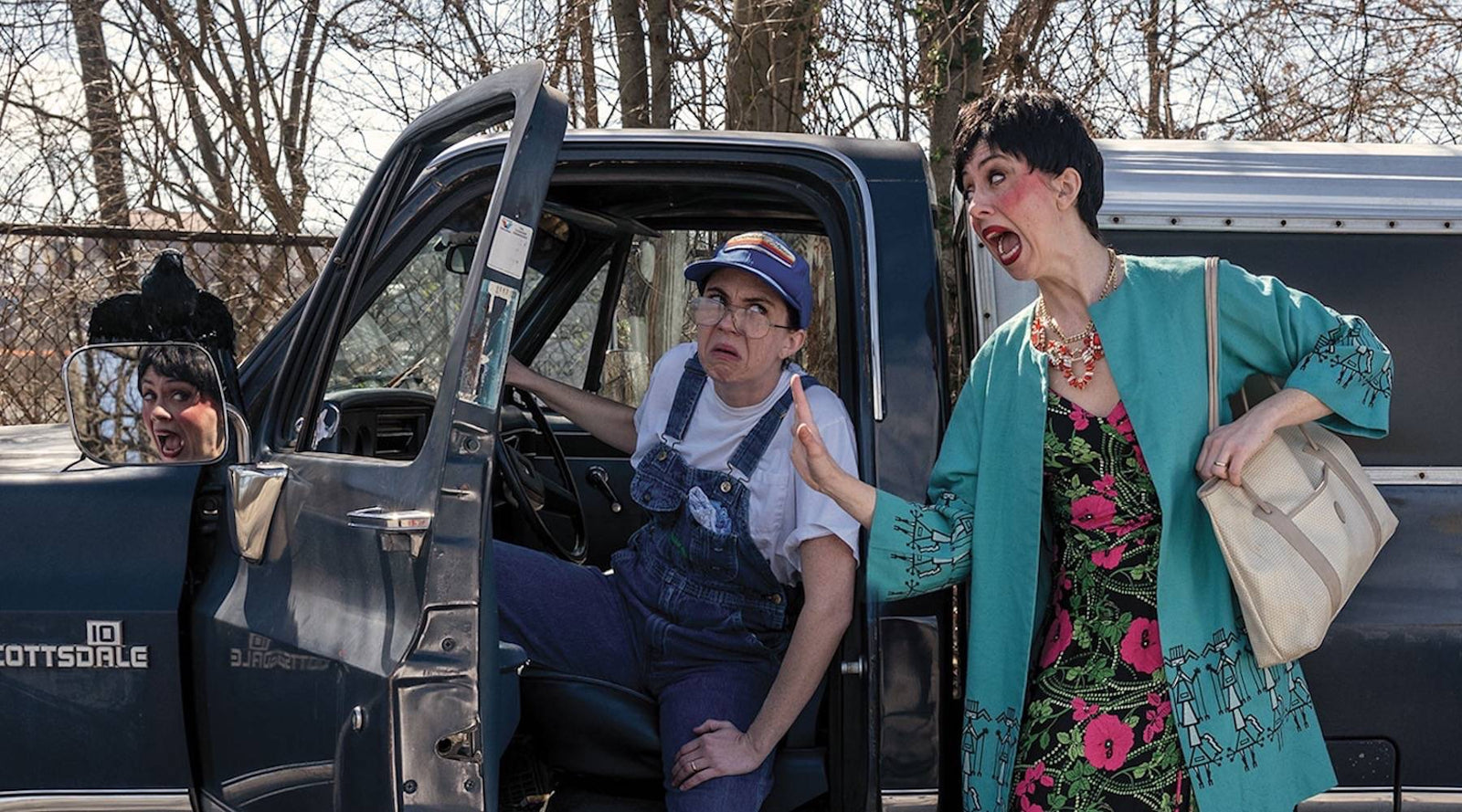
The book is filled with crystal clear imagery and compelling characters, but be warned, it isn't exactly a romantic look at the Appalachians. You won't find descriptions of dewy mountain laurel shining in the morning sun or wise backwoods grannies who make tea from hand-pulled sassafras. This is a realist's view of modern Appalachia, where the protagonist, Dellarobia Turnbow, lives in an aging ranch house with damaged shingles and a yard that is more mud than grass.
An accidental housewife, Dellarobia found herself pregnant and married younger than she ever imagined. Like dozens of my own friends back home, she excelled in school--says she wanted to go to college so bad her teeth hurt--but her dreams were deferred. Year after soul-sucking year passed, and by the time Flight Behavior opens, Dellarobia is desperate for a break from her toy-strewn living room and domineering in-laws. When we meet her, she is climbing the side of a Tennessee mountain toward an old turkey blind where she plans to have her first extramarital encounter.
As I noted in my prior post, this is the only self indulgent thing Dellarobia has done in forever. She climbs half blind because, in a fit of vanity, she left her glasses at home. As she squints to see briars and loose rocks, she considers the consequences of this affair. Her town will judge her. Her children will be branded. Still, she marches forward and comes upon a scene she cannot explain.
[caption id="attachment_6592" align="alignright" width="199"]
 Barbara Kingsolver.[/caption]
Barbara Kingsolver.[/caption]On the trees around her, she spots brownish clumps. At first, she takes them for a spreading fungus and, preoccupied, keeps walking. When she reaches an overlook, her view expands and, though her vision is blurred, Dellarobia can tell that every single trunk and twig is covered. The color is not brown so much as red. She faces an entire valley blanketed with some strange smokeless fire. It moves in waves, releasing bits like sparks from a burning pine log, but it does not crackle. This is some silent miracle, and Dellarobia knows what it means. She must go back to her family, to her cluttered yard, and to the future she was trying to escape.
Turns out, Dellarobia's future isn't as certain as she thought. As news of the miracle spreads, members of her small town congregation begin to call her a saint. Strangers ask if she's the one who had the vision. While Dellarobia can't explain what she saw, she knows why she was on that ridge, and she just wants the spotlight off of her.
That, of course, is impossible. As the book progresses, we learn that her blurred vision was actually a mass of monarch butterflies. For reasons that no one understands, most of the North American population has descended on this hollow rather than continue their usual migration into Mexico. The year's unusual warmth and endless rain may have something to do with it, but whatever the cause, the butterflies have made an unlucky choice. They've settled on land that Dellarobia's father-in-law plans to clear-cut. He's looking to sell the wood.
As soon as I hit on this environmental twist, I remembered the film Citizen Ruth. It was a 1996 comedy that centered around a drug-addicted, pregnant teen who becomes the inadvertent flashpoint for the abortion debate. Pro-life and pro-choice advocates tried to sway Ruth with bribes and deceit. After shrill protestors draw media attention, Ruth finds herself in the middle of an around the clock, nail biter of a news story. The whole country is asking "will she or won't she have an abortion." Harnessing the energy around this hot topic, the film builds a farce that skewers all sides.
I could see the same thing happening here. Media, environmental protesters, religious extremists, scientists--I expected them all to descend on Dellarobia in a rush. I figured they'd be as subtle as the Feds at the end of E.T. They'd swoop in and ruin the magic, the miracle. Their big, loud plodding presence would destroy the beautiful scene that Dellarobia found.
I was right; all of these groups showed, but Kingsolver surprised me in how they showed. They didn't come in a swarm. They didn't fill the hollow all at once. They made some noise, but it built slowly.
Rather than a team of scientists, a lone entomologist arrives first. Ovid Byron is a warm and charming man with a lilting Virgin Island accent. While Dellarobia is intimidated by his Harvard degree, she also admires Ovid's intellect and his commitment to the butterflies. Talking to Dovey, her sassy best friend, Dellarobia says that he's "like Bob Marley’s cute brother that avoided substance abuse and got an education.”
Ovid could have easily become a parody of scientists, but Kingsolver makes him something more. He serves as a gentle counterpoint to Dellarobia's underwhelming home life. He is kind to her children, respectful of her gravel-hauling husband, but as the handsome professor builds a lab in the family's sheep barn, he opens a new world of possibilities for Dellarobia.
This is a tricky balance. In Appalachia, there is real tension between everyday folk and intellectuals, between locals and outsiders, between people like Dellarobia, who can't even afford decorations for her Christmas tree, and the privileged lab students who join Ovid. "These people had everything," Dellarobia thinks when she meets them, "Education, good looks, boots whose price tag equaled her husband's last paycheck."
Dellarobia is drawn to their work, to the fancy scales they use to weigh the butterflies, to the first intellectual challenge she's experienced for years, but still, she distrusts them. In another passage, she draws out this contrast by describing audiences she has seen on TV:
Yuppies watched smart-mouthed comedians who mocked people living in double-wides and listening to country music. The very word Tennessee made those audiences burst into laughter, she'd heard it. They would never come see what Tennessee was like, any more than she would get a degree in science and figure out the climate things Dr. Byron described.
Other reviewers have described Flight Behavioras a story about climate change. That's certainly a central theme, and I like that Kingsolver explores the impact it could have on everyday folk, but I think there's more going on in the book. Flight Behavior is also about the social fabric of Appalachia, about people who work hard for every dollar, people who's sole extravagance is an ATV, people who see professors and scientists when they're flipping past the Discovery Channel but don't know what to do when a bunch of intellectuals start rooting around in their own backyards.
I have to imagine that this part of the book is informed by Kingsolver's own life. She is a wildly successful author who lives in Virginia's Blue Ridge Mountains. She not a resident of Blacksburg, where she'd be surrounded by Virginia Tech intellectuals, or even Roanoke, where she'd find a creative class. Kingsolver lives in farm country. Her neighbors are probably like Dellarobia in many ways, and I can't help but wonder if Kingsolver faced a similar chasm when she first moved to the area in 2004.
However much the book is or is not based on reality, the class divide in Flight Behavior is handled deftly. Kingsolver doesn't demonize either side or resort to tired stereotypes. She crafts fully realized characters with complex personalities and pasts. It takes many, many pages to pull that off, but it is ink well spent.
For me, reading Flight Behaviorwas like a long visit home. The characters rang true, and I identified with their lives. I know what it’s like to downgrade my purchases in a discount store because I’m broke. I know how it feels to choose my words around privileged people so they don't think I'm ignorant. When outsiders visit my homeland, I too worry that they’re pretending they’re on some hillbilly reality show--Redneck Survivor as Dellarobia puts it.
As an Appalachian native, I identified with Flight Behavior. To me, the book seemed real, more real than other novels set in the region. It was smart without being high-falutin’ and entertaining without launching into a flight of fancy.
Maybe it will feel the same for you. Maybe it already has. Are you reading Flight Behavior?
If so, let us know what you think by leaving a comment below. If not, today might be your lucky day. Harper, the book’s publisher, sent me an extra hardback copy, and one lucky person is going to win it.
To enter, just visit The Revivalist's Facebook page and click “share” beneath the November 24, 2012 post about Flight Behavior. Next weekend, I will pick one winner from folks who’ve shared the post by 9 am EST on December 1, 2012.
All you have to do is watch Facebook next weekend to see if you won!














